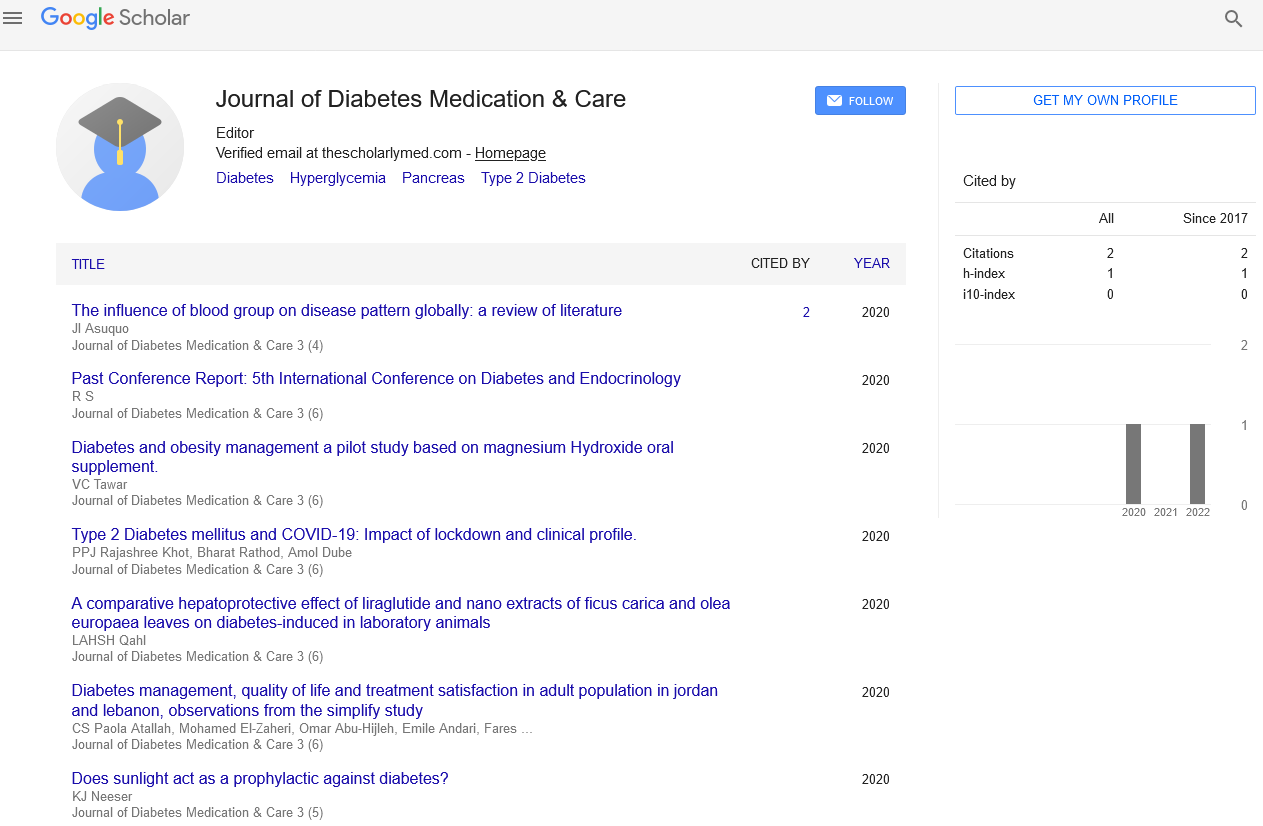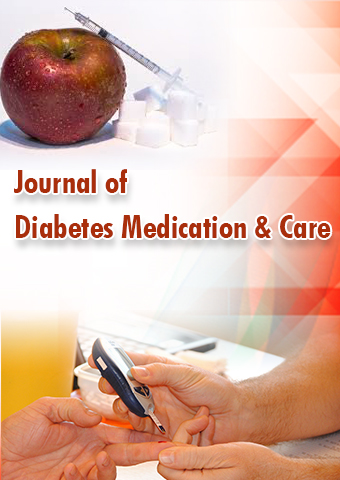Review Article - Journal of Diabetes Medication & Care (2023) Volume 6, Issue 2
Affect of Diabetess and Medication on Treatment and Outcome of Stage II Colon Cancer Patients
Reeya B*
Department of Medicine, Bhutan
Received: 03-April -2023, Manuscript No. jdmc-23-95961; Editor assigned: 06-April -2023, PreQC No. jdmc- 23-95961 (PQ); Reviewed: 20-April -2023, QC No. jdmc-23-95961; Revised: 22-April -2023, Manuscript No. jdmc-23-95961 (R); Published: 29-April -2023; DOI: 10.37532/ jdmc.2023.6(2).38-40
Abstract
Diabetes is a risk factor for colorectal cancer, and some reports suggest that cancer-specific outcomes in diabetics are worsening. Recent studies of several tumor types indicate that metformin may have a positive effect on specific cancer survival and overall survival. A population-based series of stage II colorectal cancer patients treated and followed from 2000 to 2013 were analyzed for baseline characteristics, treatment, and outcomes. 1116 patients with stage II colon cancer were identified, 55.5% were male and the mean age was 70.9 years. Patients with diabetes were older than patients without diabetes, averaging 74.0 vs 69.6, p=0.0001. There was no impact of diabetes on cancer presentation or pathology. Diabetics were less likely to receive adjuvant therapy, but were also more likely to complete treatment. Diabetes had no significant impact on cancer recurrence or overall survival, adjusted for age. Diabetes drugs had no impact on cancer recurrence or survival. Cancer expression and outcomes in patients with diabetes are comparable to those in non-diabetic patients in those with stage II colon cancer. The effects of metformin need to be further evaluated in patients with colon cancer.
Keywords
Diabetes • Colorectal cancer
Introduction
A marked increase in the incidence of diabetes has been observed in recent years. Diabetes is a risk factor for colorectal cancer, with a recent meta-analysis of 24 studies reporting a relative risk of 1.26, with no differences between studies. However, the impact of diabetes on colorectal cancer treatment and outcomes remains unclear. In a clinical trial involving patients with stage III colon cancer, diabetes was associated with an increased risk of cancer recurrence and non-cancerous death. A more recent cancer registry analysis found an increase in disease-specific mortality in colorectal cancer patients only in diabetics with rectal cancer, but confirmed an increased risk of death without cancer in all diabetic patients. An increase in overall mortality, related to the number of deaths from cancer and non-cancerous causes, has been frequently reported, including a recent study by Dehal et al., who observed an increase in cardiovascular mortality in the group with colorectal cancer and type 2 diabetes [1]. The potential impact of diabetes drugs on cancer outcomes remains an area of intensive research. Many of the potential antitumor properties of metformin and the mitogenic potential of insulin may influence cancer-specific outcomes. Metformin is a biguanide widely used in the management of type 2 diabetes. A series of retrospective studies in breast cancer patients showed increased response rates to neoadjuvant therapy in those treated with metformin, which prompted a large randomized study in the adjuvant setting. A phase II study exploring the use of metformin in prostate cancer patients before prostatectomy also showed a clinically significant impact on cancer progression. A more recent study concluded that increased cumulative exposure to metformin after prostate cancer diagnosis was associated with reduced disease-specific and all-cause mortality. Similar survival benefit was observed in diabetic patients with pancreatic cancer taking metformin. Specifically for patients with colorectal cancer, several studies have reported a positive effect of metformin use on overall survival in pooled analyzes of patients at all stages of the disease. Here, we present data from a prospective database in which comprehensive data on a consecutive series of colorectal cancer patients were entered by clinicians from four cancer centers Large, allowing us to explore the impact of diabetes and antidiabetic drugs on cancer presentation, treatment, and treatment [2-5].
Risk
A better understanding of the complex relationship between diabetes and the development and outcome of colorectal cancer requires comprehensive and reliable data. Here, we report a large, population-based analysis that did not show that diabetes had a major impact on colorectal cancer pathology, completion of adjuvant chemotherapy, or risk of disease recurrence in patients with colorectal cancer. colon cancer stage II. There were also no significant effects of individual diabetes drugs on disease recurrence or survival in this cohort. If diabetes or diabetes medications have an impact on the risk of colorectal cancer recurrence, it may be related to the aggressiveness of the primary cancer that develops in these patients. However, in our series, we were unable to find any association between diabetes or diabetes treatment and patient presentation of clinical features associated with increased risk of recurrence. . This is similar to the outcomes of the previous series [6]. We also did not observe an impact of diabetes or antidiabetic drugs on postoperative mortality. Although mortality was higher in diabetics and higher in insulin-treated diabetics, sample size and event rates limited our ability to indicate any What clinically significant differences may exist.
Diabetes medication
There is no evidence that diabetes medications have an impact on overall survival. This outcome is in contrast to three previous studies by one institution, in which metformin use was found to be associated with better overall survival. However, each of these studies, which included colon and rectal cancers of all stages, assessed survival outcomes by adjusting for disease variables, including stage at diagnosis, rather than performing now compare step by step. Potential explanations for the discrepancy between these studies and our series include a variable effect depending on the disease location of the colon relative to the rectum or the stage of the disease at diagnosis. Notably, in the Dutch study, the impact of diabetes on outcomes was limited to patients with rectal cancer. Certainly, if the difference we observed in chemotherapy rates for stage II colon cancer were replicated in stage III cases when the effects of chemotherapy were greater in these series, worse cancer survival could be expected in the diabetic population due to fewer of these cases. In an analysis of a group of stage III colon cancer clinical trials, an increased risk of cancer recurrence was found in patients with diabetes [7,8]. Unfortunately, data on patient height and weight are not available, which may be relevant to the large number of diabetic patients who are likely to be overweight, which may affect chemotherapy dosing. Treatment and may be independently associated with poorer outcomes. In addition, in this unplanned post-hoc analysis, diabetes status data were extracted in part based on recorded drug use, which many cases of diabetes would expect. When the impact of diabetes medications on overall survival was analyzed in our series, a trend was observed in favor of metformin-treated patients. Such an analysis is confounded by the fact that patientrelated factors associated with metformin use are also associated with survival. Although we did not find any significant difference in renal function, we did observe that metformintreated patients were younger and more likely to be female. Reduced survival in insulintreated patients would not be a surprise given the association of insulin use with obesity and poor diabetes control, both of which would predict mortality. Non-cancer mortality increased [9, 10]. Only one patient was documented to be taking a newer diabetes drug, a DPP-4 inhibitor, which became widely available in Australia recently.
Discussion
Our data have several strengths, including the potential nature of comprehensive data collection from the time of diagnosis through to relapse and death, the standard approach to the patient care and treatment as well as the relatively large sample size.’ sample. Diabetes status was collected at diagnosis, along with diabetes medications, and detailed data on cancer recurrence and new primary cancer were available. We chose to consider stage II colon cancer for several reasons. We felt that considering a single stage of the disease rather than a meta-analysis of all stages would allow a detailed analysis of cancer pathology and also make the interpretation of outcomes more reliable. In addition, if diabetes is considered to be an adverse prognostic factor, this could be added to the current list of highrisk features to guide adjuvant chemotherapy decision-making for these patients. case in stage II. Finally, given the low utilization rate and marginal impact of adjuvant therapy on stage II colon cancer outcomes, there is little confusion due to differences in cancer therapy, dose amount or duration of treatment. Weaknesses in our study include the relatively low recurrence rate of stage II colon cancer that makes it more difficult to detect small but clinically significant differences between groups. Furthermore, despite the relatively large overall sample size, the number of patients treated with metformin and insulin was rather modest, especially when excluding patients taking multiple drugs.
Conclusion
Our study illustrates that, for patients with arrange II colon cancer, diabetes isn’t related with clinic pathological components that are known to offer an expanded chance of cancer repeat. We found a contrast within the rate of organization of adjuvant chemotherapy, which has suggestions for arrangement looking at outcomes in hub positive cancers given adjuvant treatment has distant more prominent effect on survival outcomes in these patients. We did not watch any critical affiliations between diabetes or diabetes pharmaceutical and chance of cancer repeat or passing. Future planned, randomized thinks about will assist clarify the effect of diabetes pharmaceutical on colon cancer outcomes. They come about of such considers are energetically anticipated, both for colorectal cancer and for other cancers where metformin in specific appears guarantee as an anticancer specialist.
References
- Davis N, Forbes B, Wylie-Rosett J et al. Nutritional strategies in type 2 diabetes mellitus. Mt Sinai J Med 76, 257-268 (2009).
- Feinman RD, Pogozelski WK, Astrup A et al. Dietary carbohydrate restriction as the first approach in diabetes management: critical review and evidence base. Nutrition. 31, 1-13 (2015).
- Muley A, Fernandez R, Ellwood L et al. Effect of tree nuts on glycaemic outcomes in adults with type 2 diabetes mellitus: a systematic review. JBI Evidence Synthesis. 19, 966-1002 (2021).
- Raina Elley C, Kenealy T. Lifestyle interventions reduced the long-term risk of diabetes in adults with impaired glucose tolerance. Evidence-Based Medicine. 13, 173 (2008).
- Schellenberg ES, Dryden DM, Vandermeer B et al. Lifestyle interventions for patients with and at risk for type 2 diabetes: a systematic review and meta-analysis. Annals of Internal Medicine. 159, 543-551 (2013).
- O'Gorman DJ, Krook A. Exercise and the treatment of diabetes and obesity. Med Clin N. 95, 953-969 (2011).
- Koutroumpakis E, Jozwik B, Aguilar D et al. (2020) Strategies of Unloading the Failing Heart from Metabolic Stress. Am J Med. 133, 290-296.
- Wild S, Roglic G, Green A et al. Global prevalence of diabetes: estimates for the year 2000 and projections for 2030. Diabetes Care. 27, 1047-53 (2004).
- Carulli L, Rondinella S, Lombardini S et al. Review article: diabetes, genetics and ethnicity. Aliment Pharmacol Ther. 22, 16-9 (2005).
- Abate N, Chandalia M. Ethnicity and type 2 diabetes: focus on Asian Indians. JDC. 15, 320-7 (2001).
Indexed at, Google Scholar, Crossref
Indexed at, Google Scholar, Crossref
Indexed at, Google Scholar, Crossref
Indexed at, Google Scholar, Crossref
Indexed at, Google Scholar, Crossref
Indexed at, Google Scholar, Crossref
Indexed at, Google Scholar, Crossref
Indexed at, Google Scholar, Crossref

